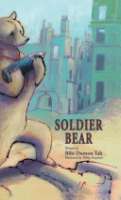
Based on a real series of events that happened during World War II, Soldier Bear tells the story of an orphaned bear cub adopted by a group of Polish soldiers in Iran. The soldiers raise the bear and eventually enlist him as a soldier to ensure that he stays with the company. He travels with them from Iran to Italy, and then on to Scotland. Voytek’s mischief gets him into trouble along with way, but he also provides some unexpected encouragement for the soldiers amidst the reality of war: Voytek learns to carry bombs for the company, saves the camp from a spy, and keeps them constantly entertained with his antics.
- ISBN: 9780802853752
- Author: Dumon Tak, Bibi
- Illustrator: Hopman, Philip
- Published: 2011 , Eerdmans Books for Young Readers
- Themes: Bears, resilience, Soldiers, War, World War II
- Descriptors: Awards, Historical Fiction, Intermediate (ages 9-14), Iran, Italy, USBBY Outstanding International Book
- No. of pages: 145

Melissa’s Take
My responses to this text deal with three anomalies. First and most important to me is that the novel, which is set during WWII in the European theater with human protagonists who are Polish soldiers, makes no mention of the Holocaust. Poland was the Nazi’s killing fields and while the characters mention they don’t want to fight for the Russians or the Germans they never give any reason why. This lack of information, the sterilization of history, is deeply disturbing to me. It is analogous to writing about the US Civil War with no mention of slavery.
This omission could be, on the surface, explained away because of the second highly unusual nature of the text, it is a WWII novel that deals with the partisan Polish Soldiers who run away through the Middle East to meet up with the British in what was then called Palestine. Very little of the action is actually set in Poland but rather follows the characters on their long overland trip. I knew nothing about these soldiers and because the book is lacking any historical notes it is up to the reader to piece together a part of history that is, indeed, foreign to most Americans. It is an interesting twist to a story that has been written about ad nuseum.
Speaking of twists, this is a children’s book with no child characters. Instead animals are substituted for the typical innocent child trope in which the reader sees the ravages of war from a romantic point of view-this time the view of a bear, two dogs, and a monkey.
Despite all of these anomalies, I found the story to be rather light and dull. The journey is not particularly fraught with peril or even, dare I say, any illuminating lessons about the folly of war. The animals are interesting enough, but their human counterparts stifle any real excitement. On the other hand, it is kind of fun to read a kid’s book in which vodka and cigarettes are mentioned in a positive light- this kind of anti-puritanical discourse gave the text the little bit of naughtiness for this reader at least.
Gail’s Take
While I knew a little bit about Germany’s and Russia’s tug-of-war with Poland, I had not heard the story of Voytek, a Syrian brown bear, adopted as a cub by Polish troops. Soldier Bear, the 2012 Batchelder Award Winner, is Tak’s “first novel based on a historical event;” and like so many erstwhile historical events, I seem to be reading about them for the first time in children’s literature (e.g. The Faithful Elephants, The Amazing Story of Adolphus Tips, Between Shades of Gray). Since I knew nothing about Voytek, I had to do some investigating…. I found a number of articles, websites (i.e. http://www.soldierbear.com/links.html), images , and a picture book about Voytek—and they all agree, Voytek was the unofficial mascot of the 22nd Company Polish Army Service Company; he was declared an official soldier so he could travel with the troops; he drank beer and ate lit cigarettes; and he and his animal cohorts raised the morale of the troops. With that said, I have to say the read was a bit rough in places, perhaps due to translation, but I found the story entertaining, particularly given many wartime stories involving animals (I still can’t bring myself to read None Came Home: The War Dogs of Vietnam or Cracker! The Best Dog in Vietnam, and I cry every time I read The Faithful Elephants), so–SPOILER ALERT–I had to read the last couple of pages first to make sure Voytek survived his active duty. Once I was satisfied, I began my read. I agree with the items of note by Melissa, but I also think the purpose of this book was to simply retell Voytek’s story in a lighthearted manner. Yet while I found Voytek interesting, I was much more drawn to Kaska—the monkey who tormented Voytek and played tricks on the soldiers. Kaska rode Stalin, an enormous dog, like a get-away horse—stealing the soldier’s items, hopping on Stalin’s back, and galloping off to the other end of camp with the soldier’s in wild pursuit! Ultimately, Soldier Bear is a “feel good” story; as a stand alone, it lacks the gritty depiction of war found in many novels, but paired with other WWII books, it gives the reader an entirely different view of what life was like for one group of soldiers.
(Kaska and Stalin illustration, p. 123)